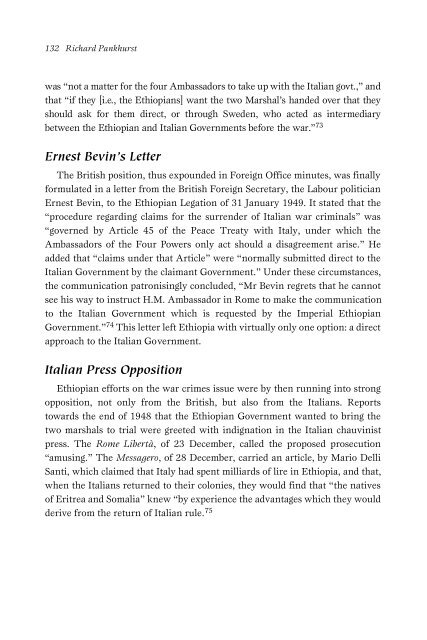Italian Fascist War Crimes in Ethiopia - Societa italiana di storia ...
Italian Fascist War Crimes in Ethiopia - Societa italiana di storia ...
Italian Fascist War Crimes in Ethiopia - Societa italiana di storia ...
Create successful ePaper yourself
Turn your PDF publications into a flip-book with our unique Google optimized e-Paper software.
132 Richard Pankhurst<br />
was “not a matter for the four Ambassadors to take up with the <strong>Italian</strong> govt.,” and<br />
that “if they [i.e., the <strong>Ethiopia</strong>ns] want the two Marshal’s handed over that they<br />
should ask for them <strong>di</strong>rect, or through Sweden, who acted as <strong>in</strong>terme<strong>di</strong>ary<br />
b e t ween the <strong>Ethiopia</strong>n and <strong>Italian</strong> Governments before the wa r. ” 7 3<br />
Ernest Bev<strong>in</strong>’s Letter<br />
The British position, thus expounded <strong>in</strong> Foreign Office m<strong>in</strong>utes, was f<strong>in</strong>ally<br />
formulated <strong>in</strong> a letter from the British Foreign Secretary, the Labour politician<br />
Ernest Bev<strong>in</strong>, to the <strong>Ethiopia</strong>n Legation of 31 January 1949. It stated that the<br />
“procedure regard<strong>in</strong>g claims for the surrender of <strong>Italian</strong> war crim<strong>in</strong>als” was<br />
“governed by Article 45 of the Peace Treaty with Italy, under which the<br />
Ambassadors of the Four Powers only act should a <strong>di</strong>sagreement arise.” He<br />
added that “claims under that Article” were “normally submitted <strong>di</strong>rect to the<br />
<strong>Italian</strong> Government by the claimant Government.” Under these circumstances,<br />
the communication patronis<strong>in</strong>gly concluded, “Mr Bev<strong>in</strong> regrets that he cannot<br />
see his way to <strong>in</strong>struct H.M. Ambassador <strong>in</strong> Rome to make the communication<br />
to the <strong>Italian</strong> Government which is requested by the Imperial <strong>Ethiopia</strong>n<br />
Government.” 74 This letter left <strong>Ethiopia</strong> with virtually only one option: a <strong>di</strong>rect<br />
approach to the <strong>Italian</strong> Government.<br />
<strong>Italian</strong> Press Opposition<br />
<strong>Ethiopia</strong>n efforts on the war crimes issue were by then runn<strong>in</strong>g <strong>in</strong>to strong<br />
opposition, not only from the British, but also from the <strong>Italian</strong>s. Reports<br />
towards the end of 1948 that the <strong>Ethiopia</strong>n Government wanted to br<strong>in</strong>g the<br />
two marshals to trial were greeted with <strong>in</strong><strong>di</strong>gnation <strong>in</strong> the <strong>Italian</strong> chauv<strong>in</strong>ist<br />
press. The Rome Libertà, of 23 December, called the proposed prosecution<br />
“amus<strong>in</strong>g.” The Messagero, of 28 December, carried an article, by Mario Delli<br />
Santi, which claimed that Italy had spent milliards of lire <strong>in</strong> <strong>Ethiopia</strong>, and that,<br />
when the <strong>Italian</strong>s returned to their colonies, they would f<strong>in</strong>d that “the natives<br />
of Eritrea and Somalia” knew “by experience the advantages which they would<br />
derive from the return of <strong>Italian</strong> rule. 75

















